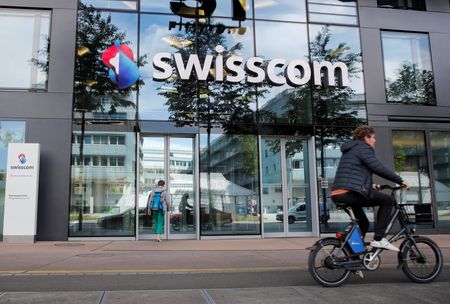(Reuters) – Slovakia’s main gas buyer SPP and groups from Hungary, Austria and Italy warned the European Commission on Tuesday of the risks of an end to natural gas transit via Ukraine, as EU officials kept out of talks aimed at keeping Russian gas flowing.
Slovakia, receiving gas from Russia via pipelines in Ukraine, has been in talks to try to avoid Russian gas flows stopping when a transit contract between Kyiv and Moscow expires at the end of the year.
Ukraine, locked in a 33-month-old war with Russia, has said repeatedly that it will not extend the gas transit agreement.
Prime Minister Denys Shmyhal said on Monday that Ukraine was willing to agree to a deal enabling gas to transit through its territory as long as it was not of Russian origin.
“The declaration that we have prepared in SPP is intended to support the continuation of gas transit through the territory of Ukraine and the preservation of its gas infrastructure,” SPP Chief Executive Vojtech Ferencz said in a statement.
“It is the most advantageous solution not only for gas consumers in Europe, but also for Ukraine itself,” Ferencz said.
SPP said its declaration was signed by Slovak pipeline operator Eustream, Hungarian groups MVM and MOL, along with industry associations from Italy, Austria and Hungary.
The declaration was sent to Commission President Ursula von der Leyen “so that she has first-hand information about the threat to energy and economic security in our region,” Ferencz said.
A spokesperson said on Tuesday that the Commission had received the groups’ declaration but was not in talks to extend the transit contract and had no interest in keeping Russian gas transit via Ukraine.
“The Commission does not support any discussions on the contract extension nor other solutions to maintain transit flows and has not been involved in any kind of negotiations on this,” the spokesperson said in emailed responses to questions.
Slovakia has said that European countries and companies have a combined demand of around 15 billion cubic metres of Russian gas next year via Ukraine.
Slovak Economy Minister Denisa Sakova held another round of talks on Tuesday with Russian group Gazprom.
With fewer route options, the loss of supplies via Ukraine transit would be a blow to buyers like Slovakia.
In SPP’s case, the company said the loss of supplies from the east would cost it an additional 150 million euros ($157 million) due to higher transit fees. The cost for the entire Slovak market would reach 220 million euros.
Amid renewed concerns over Russian gas supply, the benchmark Dutch front-month gas contract was up over 5% on Tuesday.
Deputy Prime Minister of Moldova Oleg Serebrian told Radio Moldova he had discussed with Kyiv officials how Russian gas could transit through Ukraine after the existing agreement expires, but felt that the issue was closed.
Moldova has been discussing gas supplies with Russian gas giant Gazprom, particularly to its separatist Transdniestria region, and has suggested Russian gas could be shipped by lines passing through Turkey, Bulgaria and Romania.
No agreement has yet been reached.
Russian gas is critical for Transdniestria’s residents and to supply a thermal plant that provides most of the electricity for government-controlled areas of Moldova.
But Serebrian rejected a call from Transdniestria’s pro-Russian leaders to make a joint appeal to Moscow on gas supplies.
“Just what would a joint declaration (of Moldova and Transdniestria) mean?” he asked. “Would it mean recognition of dual power centres in Moldova? Recognition of their so-called authority? That is the sub-text of such a proposal.”
($1 = 0.9537 euros)
(Reporting by Jason Hovet and Jan Lopatka in Prague, Kate Abnett in Brussels, Susanna Twidale in London and Alexander Tanas in Chisinau; Editing by Louise Heavens, Mark Potter, Ron Popeski, Mark Porter and Daniel Wallis)











